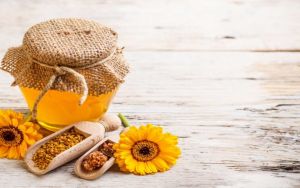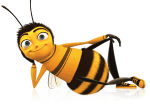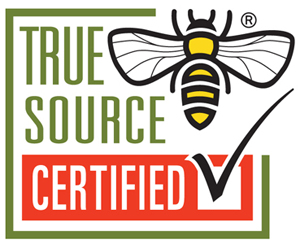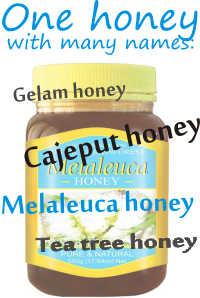1. Honey made in China.
(to be read “technologically manufactured”) In November 2011, Food Safety News announced that Vaughn Bryant, director of the Palynology Research Laboratory, had made a sad discovery: 75% of the honey on US supermarket shelves contained no pollen at all, having been made through an ultrafiltration technique perfected by Chinese producers. (Smart people, I would say, yet if they think we should eat that stuff, they are more under the intelligence of a bee.)The pollen is like the honey’s DNA, and without it, there is no proof of the country of origin or a real proof that the product is legally honey. (You can find the entire document in the references of this post.)
It is believed that this was done because the USA banned honey imports from China, due to its too low price. (Doing this, it encouraged local farming.) By ultrafiltrating the honey, the country of origin remains a mystery.
2. Honey coming from flowers pulverized with insecticides.
If the honey is produced in a hive, there are other factors we should worry about, and all come to compromise the quality of honey. For example in the United Kingdom forage conditions for bees are compromised because of the neonicotinoids considered “plant protection substances”. These are systemic insecticides, water-soluble and mobile in soil. According to latest research they will, in time, spread throughout nature, causing irreversible damage to non-target insects, and are already affecting bird populations. And, of course, affects the quality of the flower itself. Consequently some European countries banned their use. But who knows what’s the exact situation when one goes to a supermarket and all one sees is a jar with an incredible happy bee on a golden background that raise all the senses?
If you want to find out more about this, read the document here: http://www.step-project.net/files/DOWNLOAD2/Are-Neonicotinoids-Killing-Bees_Xerces-Society1.pdf
3. Honey from bees fed with sugar.
Out of greed and unconsciousness, beekeepers take all the honey from the hives, not leaving anything for the bees, for the winter. They replace it with sugar syrup. Of course there are situations, the season is a failure for example, when the bees must be fed, and not let them to starve. Still, there are other methods, and beekeepers can find this page very valuable: bushfarms.com/beesfeeding.htm
4. Honey from bees treated with antibiotics.
Some antibiotics are used as preventive or therapeutic treatments to protect the bees from extremely dangerous bacterial diseases. But only one gram of antibiotics can contaminate a ton of honey. Thus, taking an infinitesimal quantity of antibiotics we get a homeopathic effect, and become resistant to that antibiotic. We get to ‘treat’ our health with synthetic medicine instead of improving our health with natural products.
5. “Improved” honey.
After the honey was harvested, producers alter its natural features to increase its commercial quality. There are several methods to do this:
– to correct the taste they use different substances like sugar, molasses, industrial glucose, glycerin;
– to correct the color: caramel and aniline colors;
– to raise consistency: starch, gelatin, glue, pectic substances and various gums;
– to prevent fermentation: salicylic acid and benzoic acid;
– to neutralize acidity: carbonate, bicarbonate and sodium hydroxide;
– to correct the sediment: pollen – collected by bees or manually;
– to correct the enzymes: extracts from yeast cultures.
If you know any other ways of faking honey, please comment here and we will spread the news together, so everyone should know how to stay away from it.
Related posts:
Fake honey! Do you really know what you’re eating?
references:
http://www.foodsafetynews.com/2011/11/tests-show-most-store-honey-isnt-honey/#.Ux8qXj-Szki
http://www.beecharmers.org/Pollination2.html






Wait what? I never knew there is such thing as fake honey??? That sounds really scheming by honey producers! Gasp!
Speaking of honey, and bees, we need to save the bees!!
Hi McKing,
I don’t believe there is something that cannot be faked. Honey could not escape from this. We do must be very careful with it.
And yes, one good method to know it’s not fake, and also to save the bees, is to buy from locals. It is not filtered, not “improved” and you also support their business and thus help saving the bees. Tell the others, too! 🙂
Laura
Hey Laura….Joel here from guitartipsforbeginners.com. Gotta say this is a very well done website. I’m envious. I read somewhere that bees are disappearing…is that true?
Nope, bees are not.
Unbelievable, It makes me sick when I here what is happening to our foods. What great information you have posted here. I’m a label reader and I NEVER buy anything from China. I’m not sure how these people sleep at night…knowing what they’re doing. Sorry for the rant!
I really like this post. I have actually never bought honey as i only eat the honey i get from my grandfather, who is a bee keeper. I have tried other honeys before but nothing compares to all natural organic honey.
Hi Sarah,
You are very lucky to have a beekeeper grandfather. True, nothing like natural organic honey.
laura
Wow, I had no idea that we need to be so careful when buying honey!
We need to be careful with everything, till we get paranoia! 🙂 I’m kidding, of course, but with honey we have to be careful. It’s a pity not to enjoy the good stuff. And get healthy altogether.
Wow- my son has issues with poop as well and I never thought that honey would do the trick! I’m putting it on my list and will incorporate your advice into our daily diet. Thank you so much for sharing!
Seeing your message here, I’m glad I did. 🙂
Let me know if it worked.
laura
Please visit the page here: https://healthywithhoney.com/honey-cures-constipation/
Maybe something will inspire you.
This is certainly and eyeopener and very interesting enjoyed the article, glad I go for local produced honey where I can see how they create it thank you
Hi Katie,
Nowadays the eyes should be wide opened, indeed.
laura
Fake honey?!! Unbelievable. Thank you for opening my eyes to this. I live in Australia and read my lables. Last time I bought honey it was the real McCoy, but I’ll be double checking in the future for this fake nonsense, and warning others. We have our own bees/honey market. I hope it’s not taken over by the Chinese fake stuff.
I don’t know about Australia, the research was made in the US, I don’t think Australia needs to import honey from somewhere. You guys have an amazing honey there, not only manuka. It’s a good idea to read the labels though, to check that it is organic. The price is also a good indicator.
Thanks for stopping by.
laura
I had no idea there was a such thing as fake honey! Your site has opened my eyes to a whole new world! Great site!
-Kevin
thanks, Kevin.
This is a great post and an interesting read, i always cherished honey as it is one of the most natural organic foods we have,a natural sweetener and energiser, probiotic and health tonics for centuries. it is a shame people have to play around with its wholesome properties. especially now with the decline of honey bees. i look forward to reading more info from your posts. pete.
Thank you, Pete. I try to unmask here everything about honey, bad and good. People should know. Thanks for visiting.
laura
Great post, will definitely be thinking twice when purchasing honey again. It’s all about greed at the end of the day, and its unfortunate that this has happened to what used to bee a natural food source. To much of this going on in the world I think..not just with honey.
I completely agree: it’s all about greed. Unfortunately. We must be careful with everything.
thanks for the visit.
laura
I found this post very informative. I had no idea that there are so many ways to fake honey, it’s actually quite shocking. Seems like anything made in China should be avoided.
It does sound scary, yet, it’s true.
But I don’t think everything made in China is like this. I’m sure they can make great things, but in order to make lots of money in a short period of time, they invented things like fake honey, fake eggs and so on. I’m sure there are more. 🙂
We must be so very careful…
laura